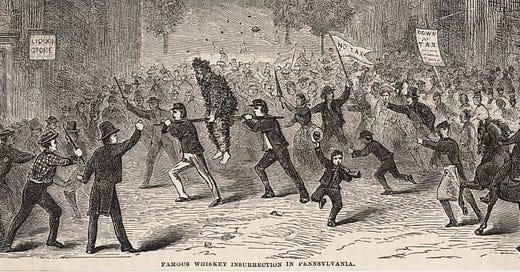(This essay is adapted from Pardongate: How Bill & Hillary Clinton and Their Brothers Profited from Pardons.)
The topics of government overreach, insurrection, presidential leadership, and executive clemency have received suffocating news coverage for months. Commentators on the cable news channels and in the pages of national newspapers have claimed nothing like this has ever happened before in the United States. However, a walk through history shows these are not the first. The nation’s earliest days featured a series of events that included claims of heavy-handed government action, the first army, the first insurrection, and the first presidential pardons. At the center of it all was the first president, George Washington.
In 1791, the constitutional republic was not even three years old. George Washington had been president for just two years. The first major dilemma facing the fledgling nation was paying off the Revolutionary War debt of about $75 million.
As an effort to raise revenue, the newly-formed government enacted the Excise Act of March 3, 1791, which levied a tax on domestically produced whiskey. Distilling and selling whiskey was a lucrative business for farmers who seized on a profitable method to utilize their grain. Grain crops had been plentiful, but farmers had been constrained in marketing opportunities as trading routes to Europe were limited when the Spanish closed the Mississippi River to American farmers. Instead, they turned their grain into alcohol to sell locally.
Farmers in western Pennsylvania’s Monongahela Valley were unhappy with the federal government-imposed excise tax. They refused to pay the tax and they forced government tax collectors to flee the area. In some cases, federal revenue agents were literally tarred and feathered before being run out of town.
Scores of whiskey tax protesters threatened to attack federal institutions in the major cities of Pittsburgh and Philadelphia as a sign of protest. By the summer of 1794, President George Washington raised an army of thirteen thousand federal troops, the new nation’s first army, to put down the “whiskey rebellion” and deal with the “treasonous” rebels.
The army marched on western Pennsylvania but found only a small number of protesters. Less than two dozen suspects were apprehended, charged, and eventually went to trial. Two were found guilty. Washington issued the first ever pardons when it was determined that the pair were incapable of acting responsibly. One was deemed insane and the other feebleminded.
On July 10, 1795, President Washington pardoned the remaining “insurrectionists” who agreed to sign a loyalty oath to the United States. At the time, Washington said the
“misled have abandoned their errors, and pay the respect to our Constitution and laws which is due…. though I shall always think it a sacred duty to exercise with firmness and energy the constitutional powers with which I am vested, yet it appears to me no less consistent with the public good… to mingle in the operations of Government every degree of moderation and tenderness which the national justice, dignity,and safety may permit.”
Mark Hyman is an Emmy award-winning investigative journalist. Follow him on Twitter, Gettr, and Parler at @markhyman, and on Truth Social at @markhyman81.
His books Washington Babylon: From George Washington to Donald Trump, Scandals That Rocked the Nation and Pardongate: How Bill and Hillary Clinton and their Brothers Profited from Pardons are on sale now (here and here).
** Feel free to share this essay with others. **



